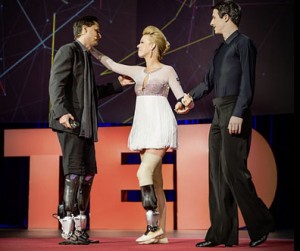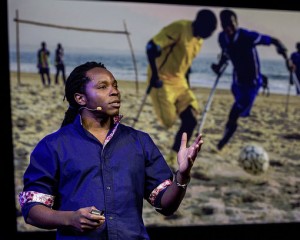MIT All-Stars Shine at TED’s 30th
-
-
slice.mit.edu
Filed Under
Recommended

Guest Blogger: Stephanie Eich, Continuum
TED celebrated its 30th anniversary this month with a weeklong conference called the Next Chapter. What began as a small gathering featuring short (≤18 minutes) talks has grown into a worldwide media phenomenon, with more than 1,600 talks available online.
In honor of its anniversary, TED (Technology, Entertainment, and Design) welcomed back some of its “All-Star” speakers from previous years. Kicking things off was MIT Media Lab founder Nicholas Negroponte ’66, MArch ’66, whose 1984 TED talk predicted tablet computing and online shopping. Negroponte offered a new prognostication this year—that one day, we will acquire knowledge by simply ingesting a pill.
Other TED All-Stars with MIT ties:
- Salman Khan ’98, MEng ’98, founder of Khan Academy
- Sir Tim Berners-Lee, MIT professor and inventor of the World Wide Web
- Joi Ito, director, MIT Media Lab
Using the virtual reality technology Oculus Rift, attendees had the chance to experience Eyewire, a game developed at Sebastian Seung’s lab at MIT that is crowdsourcing a map of the brain.

LittleBits creator Ayah Bdeir SM ’06 and biomechatronics engineer David Sengeh SM ’12 joined a TED Fellows Talk, billed as a session in which attendees should “expect the unexpected.”
Physics professor Allan Adams took on the fundamental nature of the universe, as well as an explanation of Big Bang discovery, illustrated by the comic strip xkcd.
Nancy Kanwisher ’80, PhD ’86, MIT’s Walter A. Rosenblith Professor of Cognitive Neuroscience, compared the brain to a Swiss Army knife.
Hugh Herr SM ’93, who heads the Biomechatronics research group at the MIT Media Lab, spoke of next-generation bionic limbs—and a first dance.
Ray Kurzweil ’70 explained his theory of the hierarchy of the brain.
Rodney Brooks, MIT professor emeritus and cofounder of iRobot, predicted that in the future, humans will work alongside robots, leading to a new manufacturing model.
XPRIZE founder Peter Diamandis ’83, SM ’88, announced a new competition for future TED talks on artificial intelligence.
And cyber illusionist Marco Tempest, a director’s fellow at the MIT Media Lab, showed up with his robotic friend EDI (Electronic Deceptive Intelligence).
TED’s the Next Chapter conference offered a wide range of opinions on how society and technology will evolve in the next 30 years. We’ll find out in 2044 which predictions became reality.
Watch more talks and read news from the TED 30th anniversary event.







